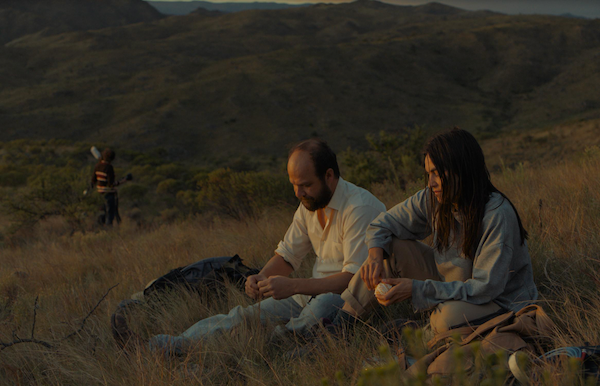Movie review by Greg Carlson
Bubbling up on multiple 2023 best-of lists and qualified for a possible Oscar nomination as Argentina’s international feature entry (prior to the eventual finalists, the fifteen shortlisted titles will be announced on December 21, 2023), Rodrigo Moreno’s excellent “The Delinquents” is a thoroughly satisfying slice of contemplative slow cinema. A simmering heist movie (in the loosest sense), the film uses the basic premise of an inside job as a springboard to a multilayered critique of clock-punching drudgery and how to break free from it. Moreno’s central characters toil away at a Buenos Aires bank, sleepwalking through the quotidian routines that add up, day after day, to a career of unfulfilling and forgettable labor – but is that all there is?
Moreno initially establishes the same kinds of bleak rhythms seen in Mike Judge’s “Office Space” and its sibling “The Office” – the stretches of quiet interrupted only by the sounds of electrical humming and corporate jargon. But unlike the lacerating comedy cooked up by Ricky Gervais and Stephen Merchant, “The Delinquents” reveals a more existential agenda. Given his access to large amounts of cash that he moves to and from the vault, Morán (Daniel Elías) at first appears to be the model of trustworthiness and responsibility. Turns out, he has decided to take $650,000 and then go to prison for the crime, trading approximately three years behind bars to net what it would take a quarter of a century to earn (times two, since half will go to a helper).
Morán has clearly spent some time figuring out the angles, so before surrendering to authorities, he targets unwitting coworker Román (Esteban Bigliardi) to mind the duffel bag stuffed with pilfered currency. In the first of several beguiling swerves, Moreno introduces a switch, as the person we assumed would drive the central narrative is set aside for the exploration of another who is equally interesting. The anagrammatic names of the two key men will soon be further entwined by the introduction of Margarita Molfino’s Norma – a playful choice Moreno extends with Morna (Cecilia Rainero), Ramón (Javier Zoro Sutton), and, for good measure, a shot of a comic book cover featuring Namor the Sub-Mariner.
Román is identified as Morán’s likely accomplice by the investigator (a great Laura Paredes) attempting to solve the embezzlement, and Moreno uses the threat of discovery to explore several enthralling ways in which we conceptualize freedom. In a sense, both men pay a certain price for their deeds. Once Román finds his way out of the city and into the countryside, where he will meet up with members of a filmmaking crew particularly attuned to careful appreciation of sight and sound, his own concerns and anxieties about holding the money melt away in favor of an idyll with no price tag. Soon, Moreno dazzles with yet another ripple/echo/switchback that would make Guy de Maupassant and O. Henry proud.
The doubling extends to Germán de Silva, cast as both bank boss Del Toro and as tough inmate Garrincha, mirrored in a way that allows Moreno to ask whether even the simplest and best-laid plan is worth the unforeseen complications of extortion and the threat of physical harm. The altogether leisurely pacing of the film, which clocks in at three hours, works on behalf of the filmmaker’s grand scheme. Split into two segments, “The Delinquents” sustains its expansive length by manipulating expectations and insisting that the journey is just as important as the destination. Additionally, Moreno stuffs the movie with intertextual gifts celebrating Argentina, including Ricardo Zelarayán’s poem “The Great Salt Flats,” Astor Piazzolla’s oboe compositions, and a vinyl copy of “Pappo’s Blues Volumen 1” for the viewer to unwrap.
